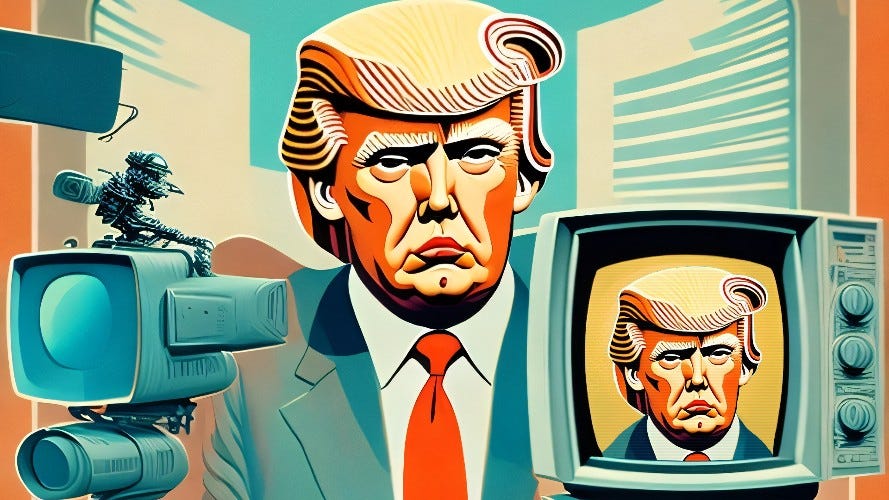
I can’t believe that Manhattan District Attorney Alvin Bragg is rebooting The Trump Show. Can’t any well-rated show just die? It’s like the Frasier reboot: I watched every minute of the original, but I’m not up for a remake where the “twist” is that everyone got fat (or fatter). TV should try new things, specifically my script about a computer nerd who body-switches with a 13th century Mongol warlord. But no: We’re getting Trump 2: Misdeed in Manhattan instead of Genghis Karl.
It once looked like Trump might be headed for a Nixon-esque fall from grace. We had one writer at Last Week Tonight who chronicled every Trump misdeed with zealous pedantry: He pitched piece after piece about Trump’s misconduct, seeming to imagine that he was Woodward and Bernstein writing the definitive record of the era. And that writer was me: I was super into that shit. I really did think that Trump would go too far, and people would turn on him, and we’d look back and think: “What did we learn from this?”
Obviously, that didn’t happen. We never had a Moment Of National Learning, largely because the public never turned on Trump en masse. Here are Trump’s approval ratings during his presidency:
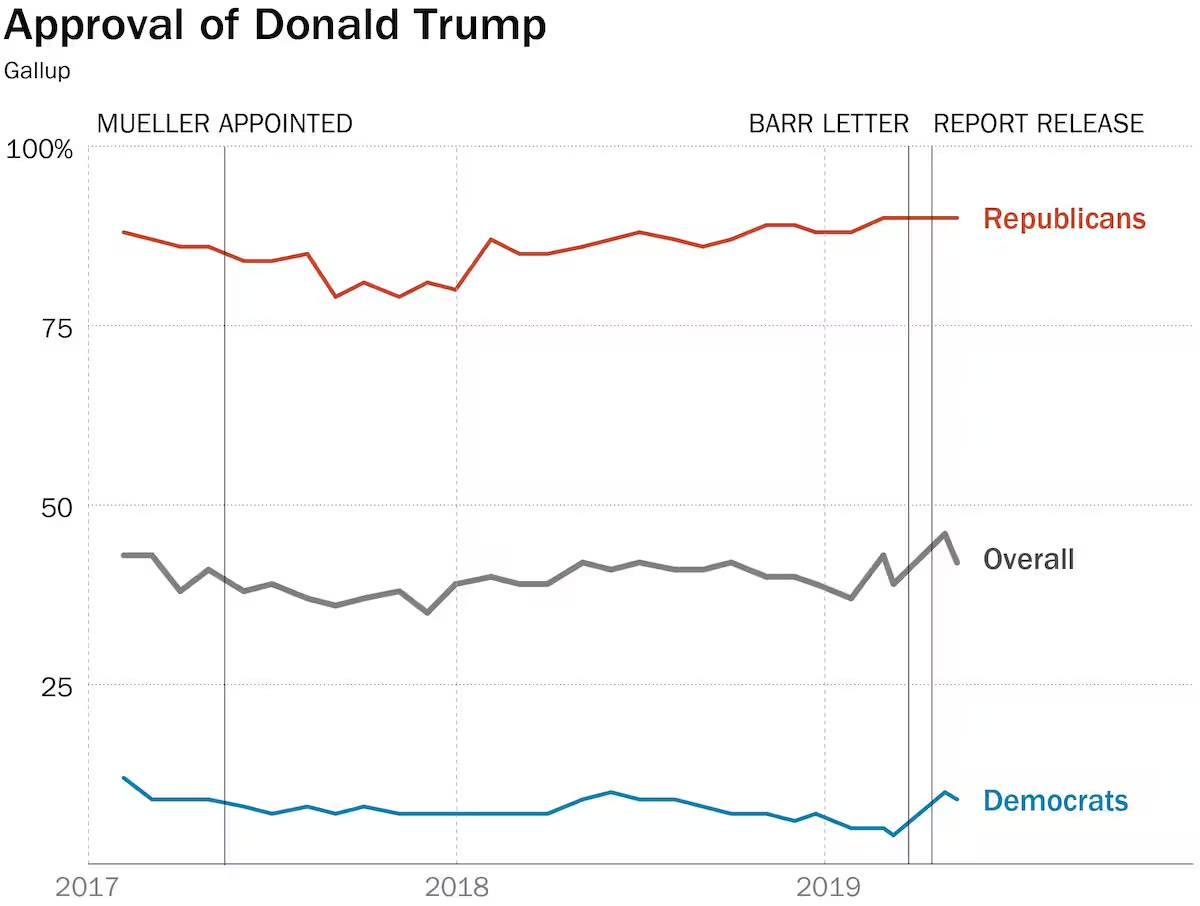
Contrast that with Nixon’s popularity:
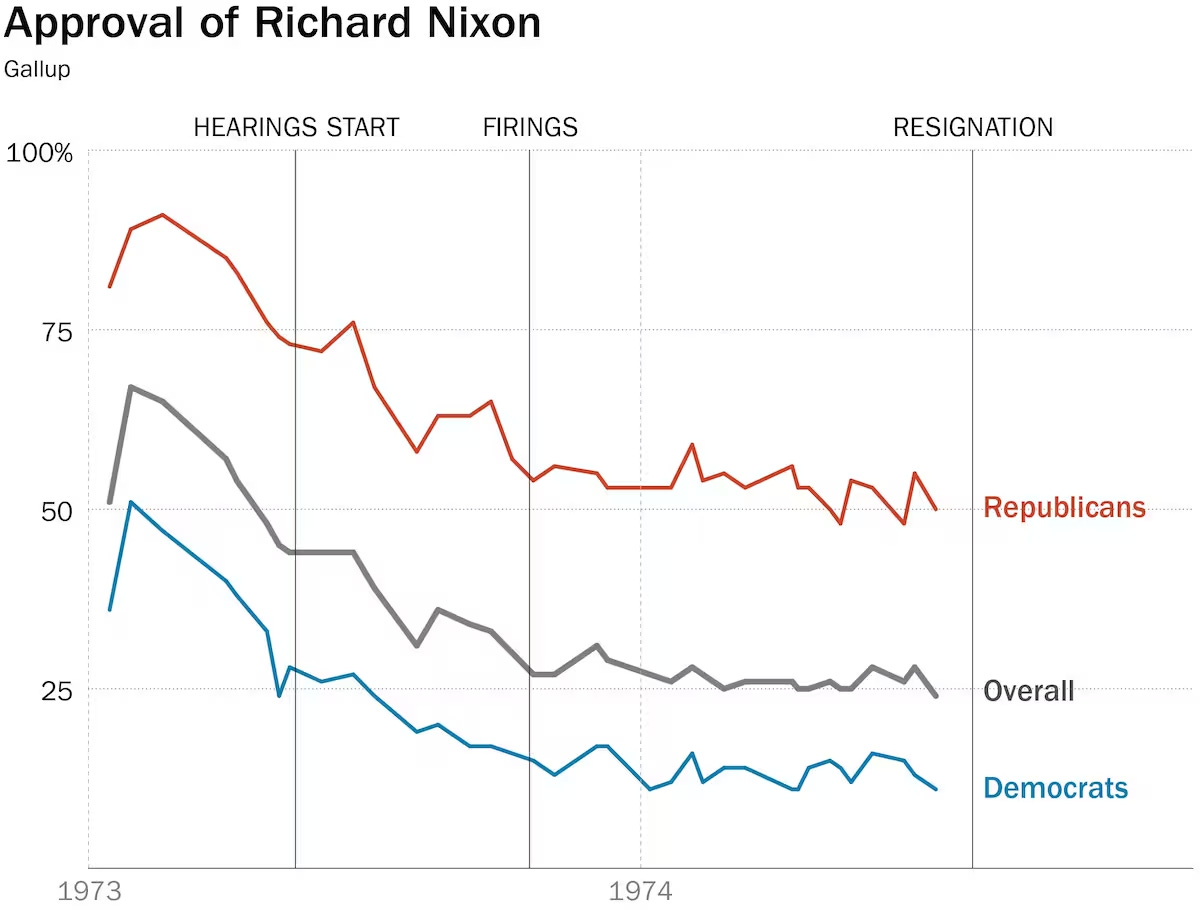
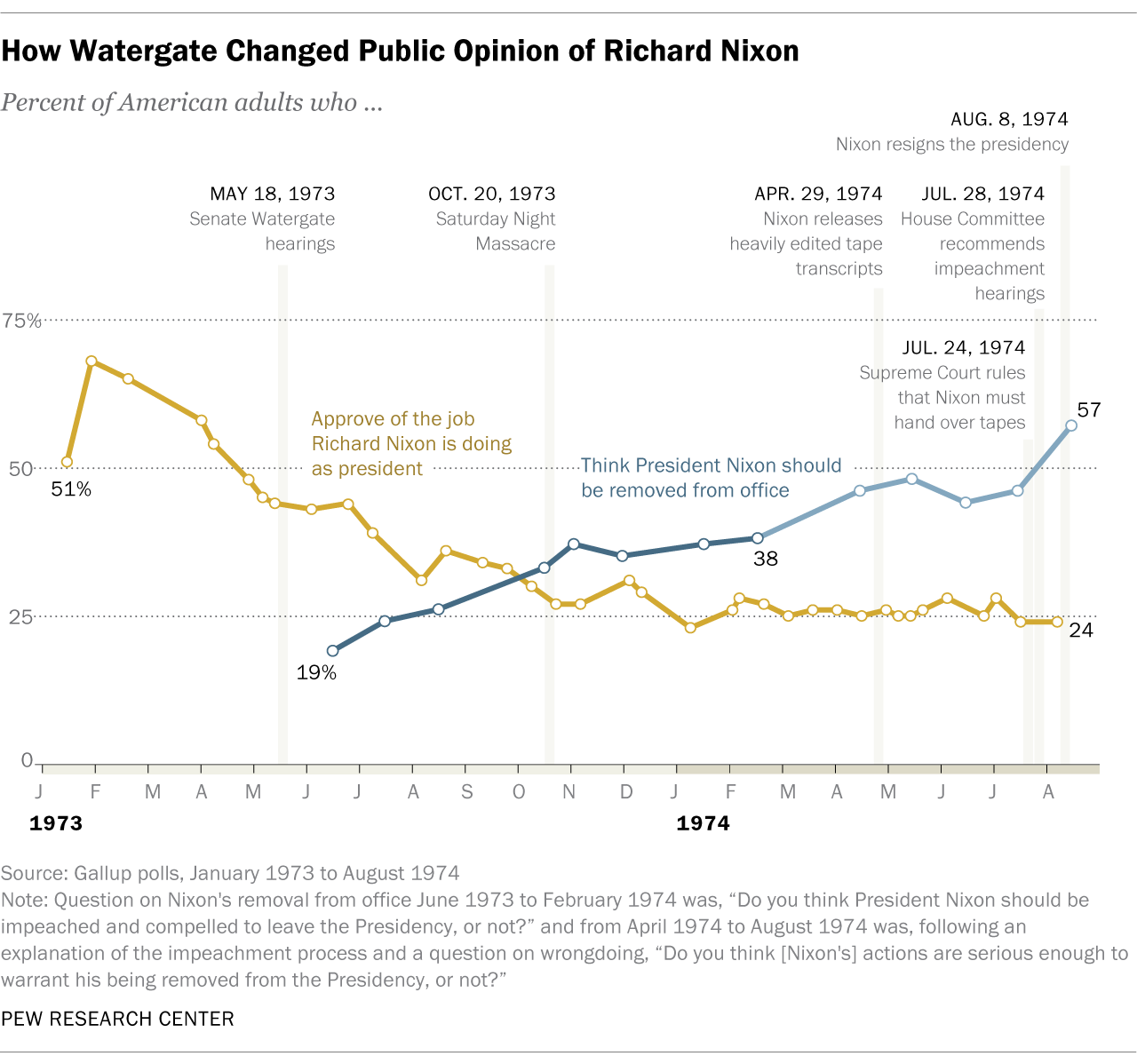
Why didn’t things go for Trump the way they went for Nixon? The charges against Trump in his first impeachment — abuse of power and obstruction of Congress — were almost identical to the charges against Nixon (and IMHO, both were guilty). Beyond that, Trump seemed to have quite obviously committed offenses several times more serious than the Mailing Hush Money With Insufficient Postage charge (or whatever it is1) that Bragg is bringing against him now. But public opinion didn’t budge. Why?
There are surely several answers to that question. It probably has something to do with political polarization (because everything has to do with political polarization), and it may also relate to changing norms and the modern media landscape and a dozen other things. But I keep thinking about this: Watergate was just a good story. They made a movie about it, and the movie was good! The Trump Show just sucks. I feel like much of what the speechwriter part of me couldn’t understand about Trump can be explained by what the TV writer part of me knows.
The Watergate Files: Presidential Investigations Unit was a TV show that was wildly popular in the early ‘70s. It ran for two highly-rated and well-remembered seasons, much like Fawlty Towers. It starred Robert Redford and Dustin Hoffman as two intrepid young reporters who got tips from a mysterious source named after an adult film: Anal MILFS 17 Deep Throat. It ended with the public still hanging on every twist and turn, and led to successful spinoffs including Bork Court and Pardon or Prosecute with Gerald Ford.

To people born after Watergate, like me, it can be easy to mentally merge the two-year Watergate saga into a single event. Many young people probably believe that Richard Nixon personally rappelled down the walls of the Watergate Hotel to break into DNC headquarters, snapped the neck of Special Prosecutor/Hapless Security Guard Archibald Cox, and then erased the incriminating video tape before being tackled on his way out by John Dean. But the information actually trickled out bit by bit, with each new development building on the last. And therein lies the genius.
The story started with a burglary — that’s a great pilot episode! But it wasn’t immediately apparent that that the break-in had anything to do with the White House. It was two months before the Washington Post connected the break-in to the Committee to Re-Elect the President, or “CREEP” (the one bit of writing in the whole series that I consider too cute by half). But the link to Nixon was still tenuous, and indeed still unproven when Nixon eeked out a narrow 503 electoral vote victory over George McGovern that fall.
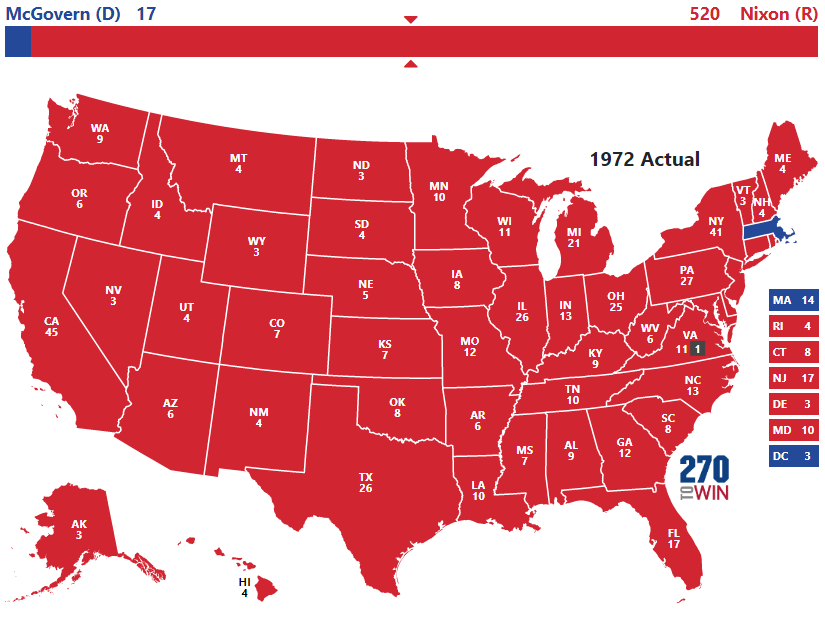
By the time the burglars went on trial in January, several juicy storylines were percolating. It had been established that Republicans were spying on Democrats and paying for the activity through a slush fund. And “slush fund” is a fun, jazzy term; no-one alive can define “slush fund” — it’s just a checking account, right? — but we all know that slush funds are bad. And Republicans were slushing their way through their dirty slush fund money, slushing here and sloshing there more than any bunch of sloshers ever slushed. Attorney General John Mitchell played the role of the Star Trek “red shirt” — the guy who gets axed early on — but White House aides H.R. Haldeman and John Ehrlichman soon followed, demonstrating that the writers were willing to knock off major characters to keep the stakes high.
By the spring of 1973, the show moved to a better time slot: The Senate Watergate Committee hearings were on TV most afternoons. They pre-empted all the soaps, so America had to watch old men talk about election law even if they would have rather watched Days of Our Lives. In those hearings, Senator Howard Baker asked the famous question: “What did the president know, and when did he know it?” This established the MacGuffin: The device that provides motivation for the characters. Everyone knew that the characters were trying to figure out if Nixon knew about the break-in. The shit about executive privilege and checks and balances was prestige TV window-dressing for the critics, like when Succession characters jabber about leveraged buyouts and deferred interest amortization. Watergate was about Nixon’s knowledge of the break-in, and the public always knew that.
The writers introduced several elements that turned out to be home runs. The secret White House recording system spiced things up just when the plot was starting to sag. Boy Lawyer John Dean had a memorable mid-season arc. Then, in the fall of 1973, they aired the bravura episode: The Saturday Night Massacre, which was kind of the Game of Thrones Red Wedding of the ‘70s. The writers enhanced the end run by introducing Rose Mary Woods — one of the best TV villains of all time — and the “smoking gun” tape and dramatic resignation gave the audience the payoff they craved. The final image of the villain fleeing in an aircraft, Doctor Evil-style, remains one of the most indelible images in TV history.
Watergate was a perfect narrative. It was simple, and it escalated. Those are two key parts of screenwriting: The audience needs to know what’s going on, and they need to continuously be given new information that keeps the plot moving. Watergate never spun its wheels, it didn’t dick around with overly-complicated plots, it just delivered exciting twists on the same theme for two years. And that’s why it captured the public imagination.
Compare that with The Trump Show — what is The Trump Show about? Russian influence? Sexual assault? Tax evasion? Election tampering? Classified documents? Inciting a riot? Part of Trump’s twisted genius is that his misconduct is so expansive that no-one can keep up with it all. To wit: A huge part of Watergate was Nixon’s defiance of Congressional subpoenas, and Trump did exactly that but practically nobody remembers. The narrative is muddled to an extent that’s only ever been matched by Arrested Development Season 4.
The plot lines are way too complicated. The Bragg indictment involves falsifying business records in New York, but to charge that as a felony, Bragg has to prove that there was intent to cover up a second crime, and Michael Cohen’s payments to Stormy Daniels may have constituted an in-kind donation to Trump’s campaign, which exceeded federal campaign donation limits, so Trump’s misclassification of the Cohen payment would abet that crime if it was done with intent to influence the election, but Trump can argue that it wasn’t, and there’s also a question of whether a New York law can be used to prosecute a violation of federal election law, because federal law supersedes state law, and the authorities that oversee Trump’s alleged federal crime chose not to prosecute…
There’s more, but I’m cutting it off there. My point is: This plot sucks. It’s waaaaay too complicated — it makes Inception look like Dude, Where’s My Car? If you send that to a network, they’re going send it back with “HOW ‘BOUT HE’S ARRESTED FOR MURDER?” written on it in big, red letters, and it will be there rare instance where the network is right. People are busy; they don’t have time to become experts on New York State election law. Nobody can follow this story, they’re not going to put in the effort to figure it out, and frankly I don’t blame them.
Finally, developments on The Trump Show routinely disappoint. Remember when we were talking about SECRET MEETINGS BETWEEN THE TRUMP TEAM AND RUSSIAN OFFICIALS AT TRUMP TOWER? Now we’re talking about possible intent to commit tax fraud. It’s basically the Lost overpromise/underdeliver model: Promise some mind-blowing reveal, deliver C.J. Cregg next to a glowing hole saying “don’t ask me about the glowing hole.” Going from “PUTIN MAY BE EXTORTING TRUMP USING VIDEO OF TRUMP BEING PEED ON BY PROSTITUTES” to “these documents were filed incorrectly” is unbelievable de-escalation. You can’t be surprised that people are underwhelmed.
None of this is anybody’s fault. In this article, I’ve been using a “pretend that Trump and Nixon’s presidencies are TV shows” device, but obviously, nobody is writing this. This is real life, where random, complicated shit happens all the time. I do think liberals made mistakes — Bragg’s prosecution seems like an overreach, and folks like Rachel Maddow (and probably me) went a wee bit overboard. But my point is not to say “we fucked this all up”. Nobody has much control here; none of us got to choose which crimes Trump would commit. It’s not like we could tell him: “Okay, now call Zelenskyy back, but this time, instead of asking for dirt on Joe Biden, ask for $100 million in unmarked bills, because that’s easier for people to understand.”
My point is that nobody should imagine that Bragg’s prosecution will lead to a groundswell of anger against Trump. That’s simply not going to happen. Bragg’s prosecution may succeed, but even if it does, there will not be a popular movement denouncing Trump’s crimes. I can’t imagine that anyone in America will think “I was with Trump through the endless lying, the obvious philandering, the racism, the admitted sexual assault, the rank incompetence, the constant bullying, the abuse of power, the extortion of an ally, the gross mishandling of state secrets, the refusal to concede an election, the recorded attempt to commit electoral fraud, and the stoking of a deadly riot, but falsifying business documents is where I draw the line!”
The public imagination has not been captured. Trump narratives are a grey hum in the background of most people’s busy lives. It’s hard for me to imagine a wrinkle that would change that, and I mostly just want this show to be off the air, permanently.
CORRECTION: An earlier version of this article incorrectly identified the second charge in Trump’s first impeachment as “obstruction of justice”. It was “obstruction of Congress”. I Might Be Wrong regrets the error and has put our fact checker to death.
I’m being jokey and glib because that’s my job, but if you want my real opinion on Bragg’s case, here it is: It appears to be an extremely weak case. I previously wrote that while I think we need to tread lightly when prosecuting ex-presidents, we also need to uphold the principle that no-one is above the law. Relating to this case, I’m reading phrases like “risky and novel case” and “dubious legal theory” — that’s exactly what you don’t want when bringing the first felony charges against an ex-president in history. It looks to me like Bragg overreached.




I want to watch Genghis Karl. Please make that show happen. Thanks.
You (and soooo many others) might be right about the Stormy case. I agree that it's complicated. I agree that for many people, it's really NBD, especially in light of all of the other things we'd like to see Trump held accountable for.
However, three mild pushbacks.
First, I don't think Alvin Bragg is dumb, either generally or politically. So, if he thinks a case can be made, I have to respect his call.
Second, even if this particular indictment doesn't result in the convictions we'd like, I think the fact that Bragg went ahead and did it may well give a shot of courage to the prosecutors looking at the other cases.
Third, there just comes a point when we have to stand up, stiffen our spines, and say, "This was wrong. It was illegal. We can't just let it slide because it might be hard to get a win." All too many Democratic officials and all too many Very Serious People in the media have been cowering, regarding Trump. If we don't draw some lines now, when will we ever?